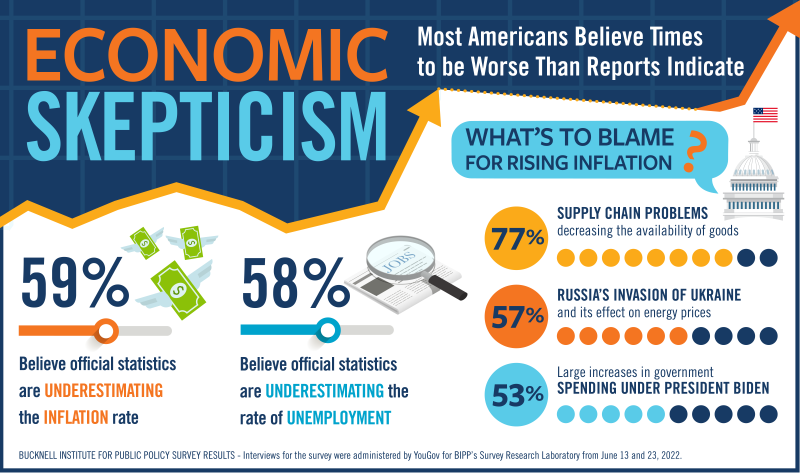Bucknell Poll: Most Americans Believe Economy to Be Worse Than Reports Indicate
July 19, 2022

Infographic by Barbara Wise, Communications
Inflation jumped to another 40-year high in June as prices increased 9.1% from a year earlier, according to the Labor Department's Consumer Price Index. Meanwhile, the U.S. Bureau of Labor Statistics reported that the unemployment rate is holding at 3.6%. But a new Bucknell Institute for Public Policy (BIPP) national survey found that the majority of Americans believe those numbers underestimate both factors.
The Bucknell poll, conducted by YouGov America, surveyed 1,500 people between June 13 and 23. It found that 59% of respondents thought official statistics underestimate the inflation rate, including 77% of Republicans, 63% of independents and 41% of Democrats. What's more, 58% of respondents also thought the official statistics underestimate the rate of unemployment, including 69% of Republicans, 60% of independents and 43% of Democrats.
"The public, in other words, thinks things are worse than the government says they are," says Professor Chris Ellis '00, political science, co-director of BIPP. "Republicans are most likely to do this, but a majority of independents and more than a third of Democrats think the same."
Ellis says the results don't bode well for Democrats heading into November's midterm elections.
"The headwinds that the Democrats face in the midterms aren't just about high inflation. It's that the public perceives economic conditions to be worse than they actually are," Ellis says. "People who vote on the economy don't just vote based on data. They vote on their experience and perceptions, and the public sees a deteriorating economy that's worse than what the data suggests."
A third of all respondents (33%) thought the official statistic accurately captured inflation — 49% of Democrats, 31% of independents and 20% of Republicans. Slightly more, 36%, thought the official statistic accurately captured unemployment — 49% Democrat, 37% independent and 23% Republican.
The survey found that "supply chain problems decreasing the availability of goods" overwhelmingly got the most blame for rising inflation, with 77% indicating it was a very important or important factor, including 81% of Democrats and 66% of Republicans, but only 44% of independents. "Large increases in government spending under President Biden" was the top choice of both independents at 56% and Republicans at 89%, compared to 24% for Democrats. Meanwhile, 77% of Democrats and 54% of independents deemed "Russia's invasion of Ukraine and its effect on energy prices" as a very important or important factor, compared to 37% of Republicans.
"People don't see everything related to inflation as the President's fault: supply chain issues are what people think is the most to blame for rising inflation," Ellis says. "But to the extent politics matter, lots of swing voters see government spending as a main culprit."
Less than half of respondents, 46%, saw "changes in the economy outside of anyone's control" as being a very important or important factor, including 62% of Republicans, 40% of independents, and 33% of Democrats.

